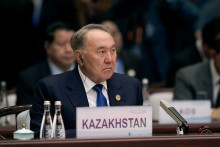Uzbekistani President Islam Karimov’s death came as a relative surprise, exacerbating the problem of the transit of power in the Central Asian states. In Uzbekistan, the problem could be solved constitutionally, with Nigmatilla Yuldashev, Chairman of the Senate taking over as acting head of state, but the man refused, saying the burden was too heavy. Prime Minister Shavkat Mirziyoyev was the only option and he became acting president.
After that events took the good old course. According to fergananews.com, first, the ex-president’s family business started being distributed and business sources reported audits of Uzbekistan’s largest wholesale market of imported goods Abu Sahy and the company of the same name. In Tashkent, word has it that the company belongs to Timur Tillyaev, husband of Karimov’s younger daughter, and that the late president’s wife Tatyana Karimova secured its protection, keeping the customs and imports under control. The ongoing audits mean that this business is being placed under the control of the likely next president, Shavkat Mirziyoyev, but that this won’t be the end of it.
Politically, these events point to Tatyana Karimova’s plummeting influence.
Kazakhstan is closely following the developments in the next-door state, trying to learn from the experience, considering that transit of power is as acute an issue in Astana as it is in Tashkent.
Here one finds several domestic and foreign political aspects. First, the regimes in Kazakhstan and Uzbekistan have much in common, based on a despotic political system. Both countries have powerful clans, known as zhuz in Kazakhstan, and their confrontation can badly damage the current stable status that took long and hard to build. This and the likelihood of Islamic radicals getting actively involved would make the bad situation worse.
Both ruling elites are aware of this danger, to some or other degree, but Kazakhstan serves as an example of possible destabilization. Suffice it to recall the Zhanaozen massacre in Kazakhstan’s western Mangystau Region, caused by the local elites that were chagrined by Astana’s policy in the west of the country. Subsequent Islamist sallies were doubtlessly supported by the locals. Under the circumstances, the speed of transit and the ability of the key political players to agree on cadre replacements are of the utmost impor!tance.
Second, despite the apparent similarity of the regimes, there is a tangible distinction. The economic situation in Kazakhstan is far better than in Uzbekistan. There is no sizable black market, even with the devaluation of the tenge, and practically no labor migration to Russia. This doesn’t mean that all is well, but there are no social tensions like those in Uzbekistan.
Kazakhstan’s political system also markedly differs from that in the neighboring country. Arkady Dubnov, Russian expert on Central Asia, believes that there is “semi-enlightened autocracy in Kazakhstan. Although the leader has been ruling this country single-handedly for so long and everything has been done on his orders, he has failed to secure the coming to power of outstanding managers, organizers of production, young technocrats. He has prepared them using programs such as Bolashak (Kazakh for future), when young people were sent to study abroad and then returned home. There emerged a tangible stratum of economically and technically trained managers and engineers who were prepared to take over the government. To some extent, it smoothes out the division into zhuzes and reduces the influence of the clans.”
Third, given Uzbekistan’s importance for Russia as the most populous state in the region, Kazakhstan comes first, primarily due to the common and practically uncontrolled border. Naturally, the problem of the transit of power in Astana is treated by Moscow as its own; after all, there is no guarantee that the Kremlin will not experience a similar situation. Nothing in this world lasts forever and anything can happen.
High level executive staff changes in Tashkent could be a coincidence, considering that they have long been discussed, but the prime minister was dismissed after Karimov’s death.
Karim Massimov led the Cabinet in 2007-12, then was appointed head of the Presidential Administration, and in 2014 resumed the prime minister’s seat. Even his enemies admit that he has accomplished a lot in that position. For example, Kazakhstan lived through the 2007-08 crisis without suffering heavy losses and attracted quite a number of Chinese investments. The current crisis, however, was a heavy blow to the national economy and Nazarbayev decided that cadre replacements would help dump the negative material that had piled up.
Massimov is appointed as Chairman of the National Security Committee. Formally a demotion, but Nazarbayev keeps this experienced manager within easy reach. Massimov has a fluent command of English, Chinese, and Arabic. Perhaps the president wants to let him gain even more experience and learn more about national security. In the event of sudden transit of power, this man will be needed and he will be in the right place. At the same time, Dosym Satpayev, director of the Risk Assessment Group, believes that Massimov has lost his status as a favorite.
As it was, Bakytzhan Sagintayev, then Massimov’s first deputy, became Prime Minister of Kazakhstan. Nazarbayev probably wants to take a closer look at him at this post and determine his further career.
The Financial Times wrote that Livia Paggi, a specialist on the region at risk consultancy GPW, said that the main beneficiary of Mr. Massimov’s dismissal appeared to be Dariga Nazarbayeva, the president’s daughter and deputy prime minister. “The removal of Massimov seems to suggest that Dariga is still in the game as a potential successor,” she said.
Constitutional changes are being gradually made in Kazakhstan, in the direction of parliamentary presidency. In this sense, the prime minister becomes a key figure. Dariga could occupy this post in the near future, and this would mean painless transit, retaining the current structure of power and the Family’s place there.
Nazarbayev apparently doesn’t want to repeat Karimov’s mistakes, preparing the future today. One problem: there is that quote from Woody Allen: “If you want to make God laugh, tell Him about your plans.”








